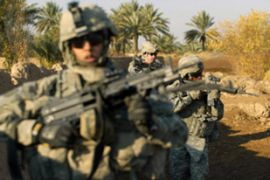US bombs outskirts of Baghdad
Local leader says many civilians are feared dead after dozens of homes were hit.

The noise of the bombing was greater than anything the villagers had heard before, even during the US-led invasion, el-Jbouri said.
Phantom Phoenix
The US military said the bombing was part of a nationwide operation against al-Qaeda, named Phantom Phoenix, launched by US and Iraqi forces on Tuesday.
A US military statement said: “Thirty-eight bombs were dropped within the first 10 minutes, with a total tonnage of 40,000 pounds.
|
Your Views |
|
“Thirty-eight bombs were dropped within the first 10 minutes” US military statementDid you witness the air raid on the outskirts of Baghdad? Send us your account. |
“More than 40 targets were hit after precision air strikes destroyed reported al-Qaeda safe havens in Arab Jabour.”
Al Jazeera contacted the US military in Iraq and a spokesman said they recieved no reports of casualties.
The bombings were carried out as ground troops of the 2nd Brigade Combat Team, 3rd Infantry Division, surrounded the area.
The air raid was followed by a ground attack that led to 12 arrests and the discovery of two houses used to torture kidnap victims, an Iraqi army officer told the Associated Press news agency on condition of anonymity.
The Iraqi army officer, whose unit is in the Arab Jabour area, said that the air strikes led to the burning of several citrus groves and the destruction of two houses used by armed fighters. He said soldiers confiscated documents and weapons including AK-47s.
Moahmoud Chiad, who lives on the edge of Arab Jabour, told AP that many military checkpoints had been set up in the area and Iraqi security forces were ordering people, through loudspeakers, to stay home.
“Minutes later, there was the sounds of big explosions. We saw fire and smoke coming out from some groves. Then, the gunfire crackled in the groves, but it ended by noon.”
US soldiers killed
Nine US soldiers were killed in the first two days of the operation, including six who died in an explosion as they entered an explosives-laden house in the Diyala province on Wednesday.
The previous day, three US soldiers were killed when they were attacked with small-arms fire while conducting operations in neighbouring Salahuddin province.
Meanwhile, a World Health Organisation (WHO) study has found that about 151,000 civilians were killed between March 2003 and June 2006 in Iraq, following the US-led invasion.
The new study, published on Wednesday, is the most comprehensive since the war started.
It drew on an Iraqi health ministry survey of nearly 10,000 households, five times the number of those interviewed in a disputed study by John Hopkins University in 2006, which said more than 600,000 Iraqis had died in the three-year period.